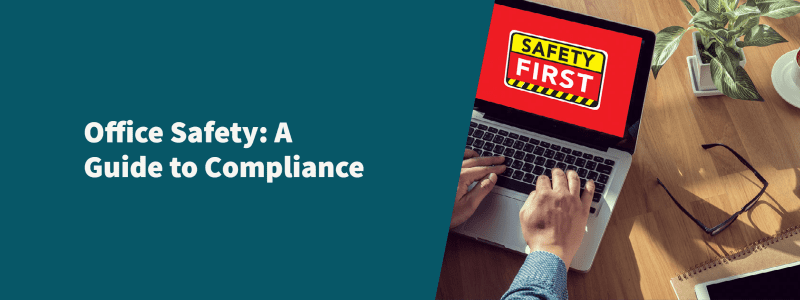Health and safety is something which should be a priority in every office. With lots of electrical equipment and what can often be repetitive tasks, there are so many dangers in an office to look out for.

Employee Health & Wellbeing
After numerous studies into whether or not work are actually good for our health, the majority of results show that it does, in fact, contribute to good health. Many of these studies show that working can boost self-esteem by way of companionship and challenging our psychological capabilities.
However, the valuable feel-good factor that boosts our self-esteem can sometimes be lost when line managers don’t respect, coach, develop and reward their staff.
.
Smoking Regulations
Since March 2006 in Scotland and July 2007 in England, smoking in public places has been illegal, with employers facing fines for as much as £2,500. A further £1,000 can be fined for not displaying ‘no smoking’ signage. Workers themselves can be fined up to £200 in England or up to £50 in Scotland for smoking in the workplace. In Scotland, there is a fixed penalty of £200 which could rise to as much as £2,500 if the fine is not paid.
These rules also apply to shared commercial vehicles and signage must also be displayed. Staff smoking rooms are now obsolete and the only smoking rooms left are those within residential care homes. These rooms must be well-ventilated and penalties can be issued if smoke travels to other rooms.
There are currently no laws on e-cigarettes and this is subject to the employer’s decision. Below are the fine amounts for Scotland and England.
| Scotland | England | |
| Smoking in Public Places ban: | March 2006 | July 2007 |
| Fines for allowing workers to smoke: | £2500 | £2500 |
| Fines for not displaying ‘No smoking’ signs: | £1000 | £1000 |
| Fines for workers smoking indoors: | £50 | £200 |
| Fixed Penalties: | £200 | – |
.
Rest Breaks
There are rules around giving employees breaks, and how long they are entitled to have during the hours they work.
Workers over the age of 18 are entitled to rest breaks on a daily and weekly basis. Each employee is entitled to a 20-minute rest break if they work more than 6 hours a day and should also receive daily breaks of a minimum of 11 consecutive hours. This is why overtime is not, and will never be, mandatory. Weekly rest should be either 24 consecutive hours a week or 48 consecutive hours every fortnight.
.
Fire Safety
By law, every employer is responsible for fire safety in the workplace, meaning that they have a duty of care to ensure there have been adequate risk assessments carried out prior to allowing the workforce to enter commercial premises.
Every organisation should have a designated evacuation team or Fire Warden, and a suitable replacement assigned if they are absent. This team or sole person will be responsible for ensuring that the workplace is evacuated safely and quickly in the event of an emergency.
Every employer is legally obligated to ensure there is a suitable and carefully planned emergency strategy in place for in the event a fire occurs.
.
Display Screen Equipment (DSE)
With computers and the internet being used heavily in almost every workplace, the use of display screen equipment has quickly become commonplace. Workers who are using this equipment are currently exposed to harm if it isn’t managed correctly.
As stated in the Health and Safety (Display Screen Equipment) Regulations 1992, each and every employer has a duty of care to ensure that workstations have been analysed for risks and to ensure that the correct measures of control are in place to help avoid RSI or digital eye strain.
In law, employers must:
- do a DSE workstation assessment
- reduce risks, including making sure workers take breaks from DSE work or do something different
- provide an eye test if a worker asks for one
- provide training and information for workers.
.
Trips, Slips & Falls
The Health and Safety at Work Act 1974 states that employers must ensure the health and safety of all employees and anyone affected by their work. Currently, slips, trips and falls are the most common cause of injury in the workplace, with 37% of all reported injuries coming from that category. This costs businesses a total of £1 billion a year.
Employers must assess the level of risk and find a way to control slip and trip risks and, where necessary, take appropriate action to address them. This should be communicated and actioned in your risk assessment.
.
First Aid
First aid facilities are essential in any workplace. Employees are unknowingly at risk of accidents every day, no matter how well you assess the risks. In 2020/21, 142 workers were killed at work, and 693,000 injuries occurring in the workplace during the previous year. Knowing how to respond to an incident may result in faster treatment which really can be the difference between life and death.
Low-risk workplaces such as small offices must have a suitably stocked first-aid kit and a member of staff appointed to take charge of first aid. This person is responsible for being the first port of call. Yet, training more employees to operate as first aiders will be beneficial if your employees have an accident. Legislation states that employers must provide information about first aid arrangements to their employees. High-risk workplaces must have a trained first aider in-house.
Employers are expected to have an appropriate first aid action plan and should consider the circumstances of the workplace, workforce and potential risks in order to decide what arrangements are needed.
.
Risk Management
Risk management is required by law. Legislation states that when employing 5 or more employees, employers must keep records of their risk assessments and findings. Employers are expected to:
- Avoid risks by way of risk assessment and eliminating the threat
- Evaluate unavoidable risks and ensure their containment
- Reduce the volume of monotonous work or provide more frequent rest breaks
- Acclimatise to technical advancement
- Ensure a clear and precise prevention policy is in place – this must cover technology, organisation of work, working conditions, social relationships and the influence of factors relating to the working environment
- Ensure workers are given appropriate instructions where required
.
Incident Reporting
On the 1st October 2013, the Reporting of Injuries, Diseases and Dangerous Occurrences Regulations were revised and RIDDOR 2013 came into force.
RIDDOR is a law that requires employers to report and keep records of work-related incidents with the potential to cause harm.
.
Back










